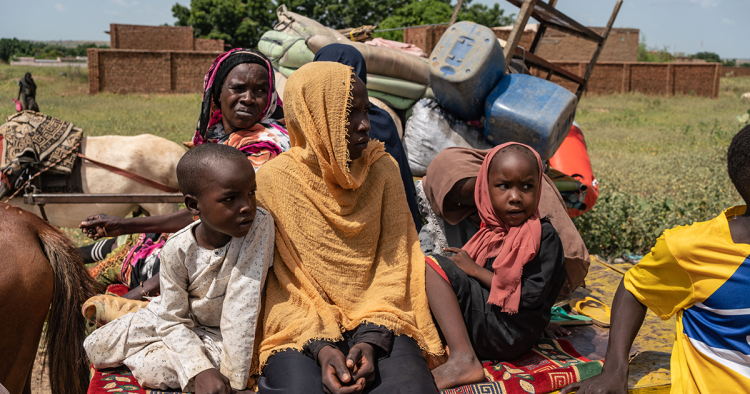It isn’t a surprise that Sudan’s two warring sides — the Sudanese Armed Forces (SAF) and its sprawling paramilitary Rapid Support Forces (RSF) — did not agree to a ceasefire. When they resumed talks in Jeddah, mediated by the United States and Saudi Arabia in late October, the RSF was busy launching a major offensive on the vast western region of Darfur.
First, they took over a military base in Nyala, capital of South Darfur and Sudan’s second largest city, and then in Zalingei and again in El Geneina, a city they had already ravaged. In the suburb of Ardamata, they reportedly killed scores of civilians and forced SAF soldiers to retreat to Chad, along with thousands of civilians escaping the violence.
Drawn from the Janjaweed militia that Sudan’s former autocrat ruler, Omar al-Bashir, deployed for decades in restive peripheries to battle rebels and punish civilians who supported them, the RSF has finally consolidated control over the region. Many have warned of a Libya-like scenario of de facto division, whereby the RSF dominates the western region to Khartoum and the SAF dominates in the north and east from Port Sudan.
The Jeddah talks, which began in April weeks after the war erupted in Khartoum, were suspended because the warring parties failed so many times to keep their promises. They instead proceeded to prosecute a war that has laid waste to the historic capital, destroyed homes, clinics, markets and infrastructure, and caused untold human suffering. In West Darfur, the RSF and allied militias have razed villages, carried out unlawful killings, committed rapes, and pillaged, driving hundreds of thousands of ethnic Massalit over the Chad border.
The toll on civilians is beyond dire. Nearly 6 million people were forced to flee from their homes, with over 1.3 million now refugees in neighboring countries. The death toll is certainly higher than the 10,400 reported and sexual violence — especially by the RSF — appears commonplace. Over half the country’s population need aid, but organizations have struggled to deliver it; diseases like cholera are spreading; farming is interrupted; and food insecurity has increased.
Most analysts say there can be no military solution; Sudan is simply too vast and neither side has what’s needed to win. The RSF may have plenty of foot soldiers, but their appalling abuses against civilians, including atrocity crimes, have discredited them even as they ply pro-democracy rhetoric. The SAF, which perversely gained credibility, even from those who had opposed its repression and violence, lacks foot soldiers.
Both may have reason to bide their time, with legacies of atrocity crimes and repression and unfinished propaganda wars. The SAF, while it projects a nationalist institution, has badly fumbled public relations and squandered opportunities for support by adopting Bashir-era stances, particularly against the U.N. The RSF, better at pro-democracy and human rights rhetoric, is still a criminal enterprise with an abusive and underage militia force.
Still, some baby steps are better than none. Even if the two sides do not want to lay down their guns, they did resume talks, recommitting to their past promises to protect civilians and facilitate delivery of humanitarian aid, now with the U.N.
Yet there are other obstacles. The Jeddah talks are limited in scope and don’t address the regional political landscape that sustains the war. Sudanese civilians, including the “street” that forged the revolution in 2018-19, some of whom remain in war zones to help those who could not flee, are scattered, traumatized, stressed, and politically and emotionally divided.
It has long been clear that external actors, including and especially the United Arab Emirates, are supplying weapons, in violation of existing international arms embargos and end-user agreements. As many have argued, the diverse community of regional and international actors concerned with Sudan — the Troika, the U.N., the Intergovernmental Authority on Development, the African Union, and neighboring states — need to speak with one voice, press malign actors to stop fueling the war, and expand the U.N.’s Darfur arms embargo to the whole country.
Another important priority is to help, to the greatest extent possible, Sudanese civilian people, in whatever groupings they choose, to build an inclusive and representative civilian front. In late October, various groups met in Addis Ababa to take the first steps to form an anti-war, pro-democracy front. If successful, such a front could begin to forge a future for the country without the warring parties. But the effort needs to be genuinely inclusive and representative to stick; many more such gatherings will be needed.
Jehanne Henry is a human rights lawyer and researcher with a particular focus on Sudan and South Sudan. She is also a non-resident scholar with MEI’s Egypt and the Horn of Africa Program.
Photo by Abdulmonam Eassa/Getty Images
The Middle East Institute (MEI) is an independent, non-partisan, non-for-profit, educational organization. It does not engage in advocacy and its scholars’ opinions are their own. MEI welcomes financial donations, but retains sole editorial control over its work and its publications reflect only the authors’ views. For a listing of MEI donors, please click here.













